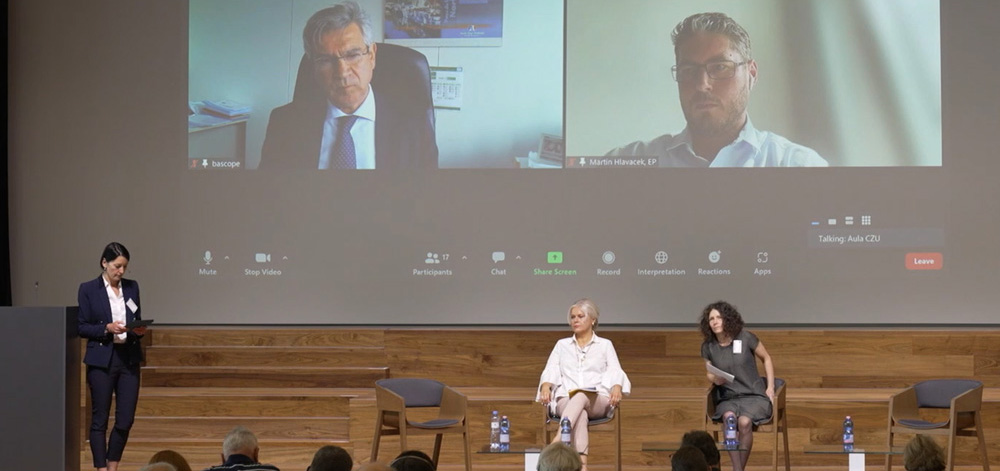Steps to achieve the CAP targets
Czech Regional Event session 1 summary
Friday, Jun 10, 2022
At the ForumforAg Czech Regional conference held on May 18 at the Czech University of Life Sciences Prague, the pressing question posed during session 1 ‘Can we achieve the environmental targets with the new CAP and the National Strategic Plans?’ brought our panellists plenty of challenges from the audience. Livestock reduction, how best to improve soil, and the need for wide consultation on the national plan were among them.
How does the CAP strategy tie in to farmers’ interests?
Pierre Bascou, Director Sustainability Directorate, DG Agriculture and Rural Development, European Commission, said the goal is to support a sustainable transition of the whole food chain, and the climate neutrality of the entire land use sector. And to do so while balancing the economic objectives and helping farmers with their environmental and climate performance. It was essential to accompany farmers by offering them training and advisory services. “We need to support and encourage farmers to innovate, to change practices, to adapt to the latest knowledge in terms of agronomic practices, producing, way of marketing, etc.”
Can the CAP goals be achieved at scale?
Martin Hlavacek MEP, Member of the European Parliament, said “we could, but very likely we will not”. To succeed, the 10 million farmers across Europe all need a solution they can implement on the ground. Member states have flexibility, losing the commonality of the CAP – and some of the practices states adopt may not bring results. Better policy coherence is also needed if Europe is to achieve the CAP goals, he said, citing legislative barriers that block technological innovations. Success depends on whether Europe sticks with business as usual or allows acceleration of the trends that need to be accelerated.
Alžběta Procházková, WWF Central & Eastern Europe, said environmental objectives needed to be fine-tuned for a specific area, for a specific region. “So we have to tailor make the objectives and prepare a scale of the rules for environmental measures so that they can be applied across the whole of the EU.”
One farmer present took issue with the EU on a number of policy approaches: on reducing livestock farming – “which we need for manure” – , on farming land in smaller parcels, and on “not being ambitious enough” in reducing pesticide use. Speaking as another highly experienced famer, panellist Monika Nebeská, Chairwoman of the Board, Agricultural Cooperative Všestary, agreed it was “nonsense” to continue reducing livestock as it was a part of the agricultural cycle, for example, contributing to retaining water in the landscape. On pesticides, she said farmers were bound to stick to limits but there was no real support for how to do that. “It’s restrictions and restrictions again, only farming that that is blamed.”
Is the Czech Republic ambitious enough in its draft national strategic plan as regards environment and climate?
Pierre Bascou answered that the ambition was “not sufficient” in three areas – 1, greenhouse gas emissions, 2, biodiversity protection and development and, 3, the design and definition of the different types of intervention that would help farmers to improve in their environmental and climate performance. “This is what we are currently discussing, to revise the level of ambition upwards,” he said.
Do we need evolution or revolution?
“Should we perhaps be more lenient and slower in introducing these measures? Have the farmers had enough time to impose these measures, to implement these measures?” asked the Moderator, journalist Naděžda Hávová. Pierre Bascou said it was neither – rather, accelerated evolution. “We need to accelerate the transition which is currently on the table… We need to provide financial incentive. We need to provide advisory. We need to facilitate the use of innovation… We need to better tailor the financial support… because each farmer needs a specific solution.”
Martin Hlavacek added that what is needed is an evolution of the practices on the farm but a revolution in other areas, for example, technology. “Why are we not having a revolution on new genomic techniques? If we are talking about reduction of fertilizers and pesticides, why we are not having a revolution… on approvals of new active substances and authorizations of alternatives to those we are banning?”
Building on the question, Alžběta Procházková said what was needed was cooperation. In her opinion, in the Czech Republic in particular, “we have a problem because the cooperation is not sufficient… some farmers see us (NGOs) as opponents, as somebody doing things that go against what farmers want to do. And they don’t believe that we are searching for joint solutions.” She called for greater cooperation, including in the drafting process for the national plan and between different ministries. Better communication with the public was also needed – society as a whole needs to own the plan.
Would you like to explore the debate in greater depth? Watch the recording of the full discussion.


